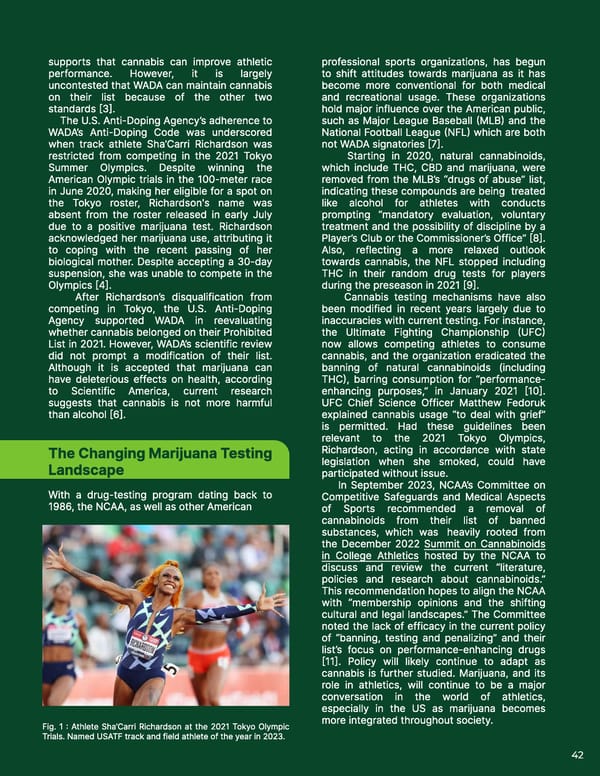supports that cannabis can improve athletic professional sports organizations, has begun performance. However, it is largely to shift attitudes towards marijuana as it has uncontested that WADA can maintain cannabis become more conventional for both medical on their list because of the other two and recreational usage. These organizations standards [3]⸀ hold major influence over the American public, The U.S. Anti-Doping Agency’s adherence to such as Major League Baseball (MLB) and the WADA’s Anti-Doping Code was underscored National Football League (NFL) which are both when track athlete Sha’Carri Richardson was not WADA signatories [7].ꀀ restricted from competing in the 2021 Tokyo Starting in 2020, natural cannabinoids, Summer Olympics. Despite winning the which include THC, CBD and marijuana, were American Olympic trials in the 100-meter race removed from the MLB’s “drugs of abuse” list, in June 2020, making her eligible for a spot on indicating these compounds are being treated the Tokyo roster, Richardson's name was like alcohol for athletes with conducts absent from the roster released in early July prompting “mandatory evaluation, voluntary due to a positive marijuana test. Richardson treatment and the possibility of discipline by a acknowledged her marijuana use, attributing it Player’s Club or the Commissioner’s Office” [8]. to coping with the recent passing of her Also, reflecting a more relaxed outlook biological mother. Despite accepting a 30-day towards cannabis, the NFL stopped including suspension, she was unable to compete in the THC in their random drug tests for players Olympics [4]⸀ during the preseason in 2021 [9]⸀ After Richardson’s disqualification from Cannabis testing mechanisms have also competing in Tokyo, the U.S. Anti-Doping been modified in recent years largely due to Agency supported WADA in reevaluating inaccuracies with current testing. For instance, whether cannabis belonged on their Prohibited the Ultimate Fighting Championship (UFC) List in 2021. However, WADA’s scientific review now allows competing athletes to consume did not prompt a modification of their list. cannabis, and the organization eradicated the Although it is accepted that marijuana can banning of natural cannabinoids (including have deleterious effects on health, according THC), barring consumption for “performance- to Scientific America, current research enhancing purposes,” in January 2021 [10]. suggests that cannabis is not more harmful UFC Chief Science Officer Matthew Fedoruk than alcohol [6]㠀᐀ explained cannabis usage “to deal with grief” is permitted. Had these guidelines been relevant to the 2021 Tokyo Olympics, Richardson, acting in accordance with state The Changing Marijuana Testing legislation when she smoked, could have Landscap漀 participated without issue⸀ In September 2023, NCAA’s Committee on With a drug-testing program dating back to Competitive Safeguards and Medical Aspects 1986, the NCAA, as well as other American of Sports recommended a removal of cannabinoids from their list of banned substances, which was heavily rooted from the December 2022 Summit on Cannabinoids in College Athletics hosted by the NCAA to discuss and review the current “literature, policies and research about cannabinoids.” This recommendation hopes to align the NCAA with “membership opinions and the shifting cultural and legal landscapes.” The Committee noted the lack of efficacy in the current policy of “banning, testing and penalizing” and their list’s focus on performance-enhancing drugs [11]. Policy will likely continue to adapt as cannabis is further studied. Marijuana, and its role in athletics, will continue to be a major conversation in the world of athletics, especially in the US as marijuana becomes more integrated throughout society⸀ Fig. 1 : Athlete Sha’Carri Richardson at the 2021 Tokyo Olympic Trials. Named USATF track and field athlete of the year in 2023⸀ 42
 Penn Healthcare Review Fall 2023 Journal— Sports Medicine Page 46 Page 48
Penn Healthcare Review Fall 2023 Journal— Sports Medicine Page 46 Page 48